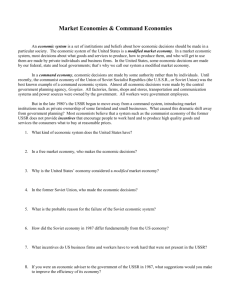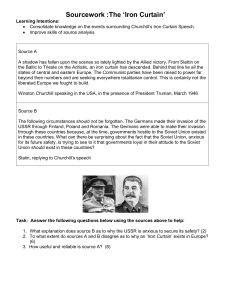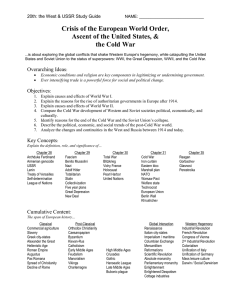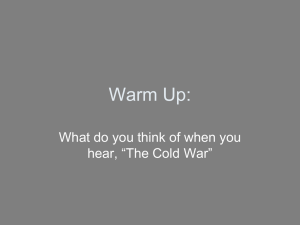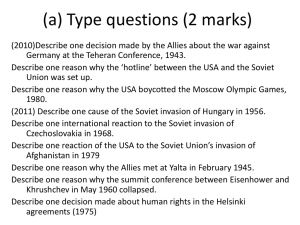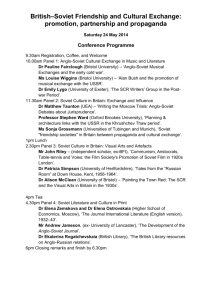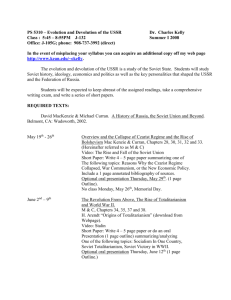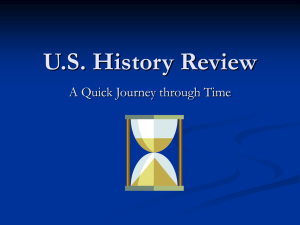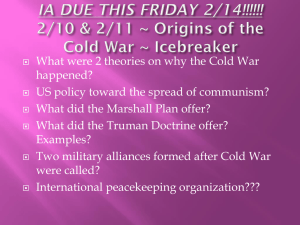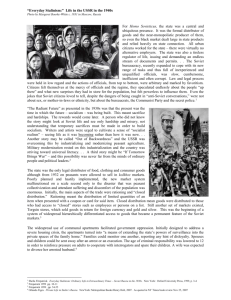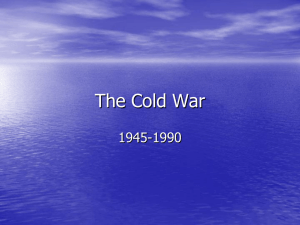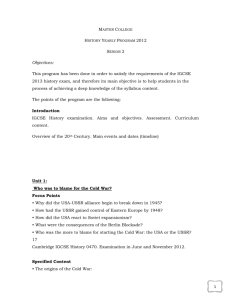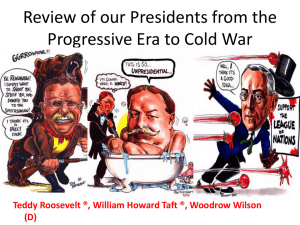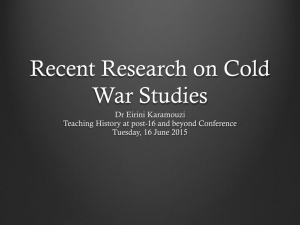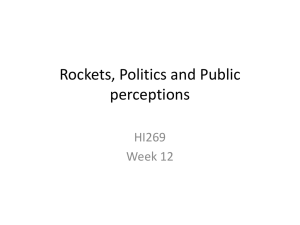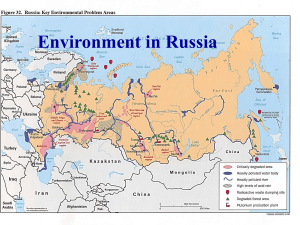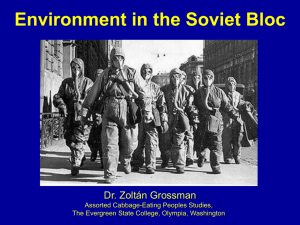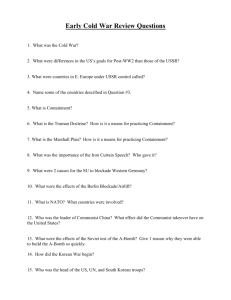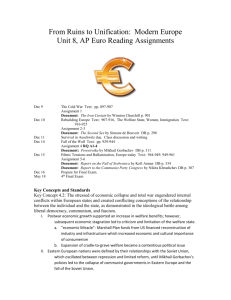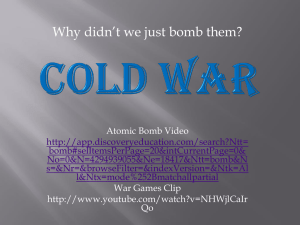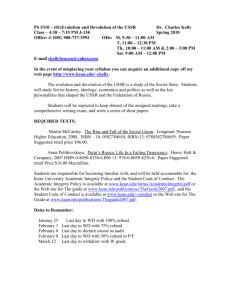Higher School of Economics
advertisement
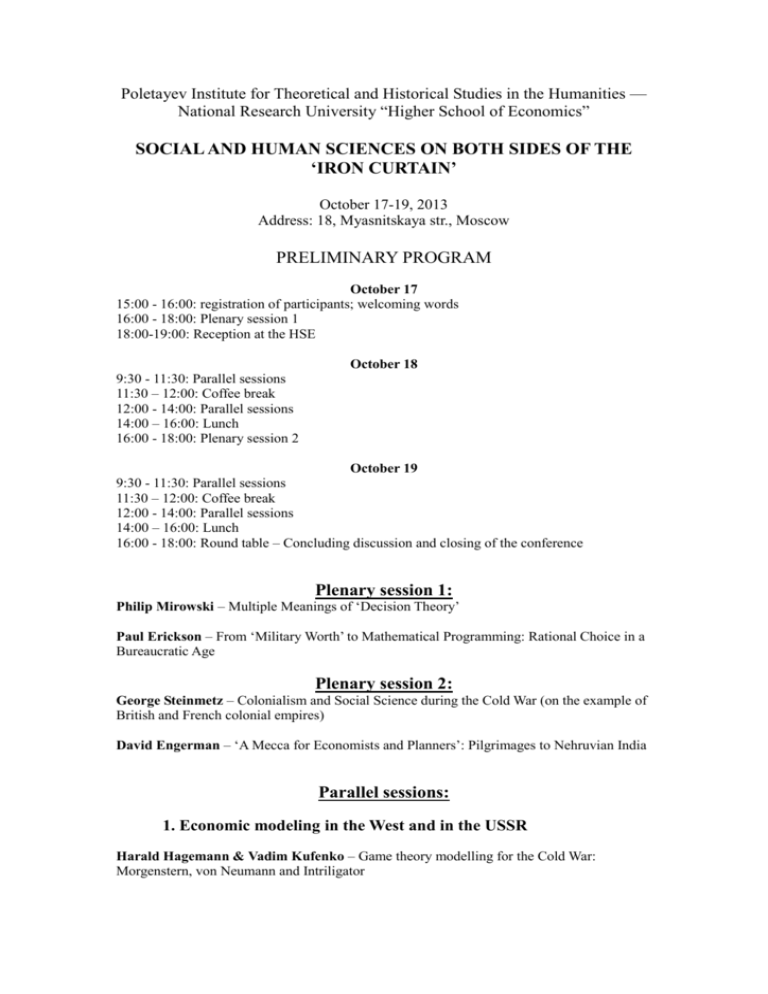
Poletayev Institute for Theoretical and Historical Studies in the Humanities — National Research University “Higher School of Economics” SOCIAL AND HUMAN SCIENCES ON BOTH SIDES OF THE ‘IRON CURTAIN’ October 17-19, 2013 Address: 18, Myasnitskaya str., Moscow PRELIMINARY PROGRAM October 17 15:00 - 16:00: registration of participants; welcoming words 16:00 - 18:00: Plenary session 1 18:00-19:00: Reception at the HSE October 18 9:30 - 11:30: Parallel sessions 11:30 – 12:00: Coffee break 12:00 - 14:00: Parallel sessions 14:00 – 16:00: Lunch 16:00 - 18:00: Plenary session 2 October 19 9:30 - 11:30: Parallel sessions 11:30 – 12:00: Coffee break 12:00 - 14:00: Parallel sessions 14:00 – 16:00: Lunch 16:00 - 18:00: Round table – Concluding discussion and closing of the conference Plenary session 1: Philip Mirowski – Multiple Meanings of ‘Decision Theory’ Paul Erickson – From ‘Military Worth’ to Mathematical Programming: Rational Choice in a Bureaucratic Age Plenary session 2: George Steinmetz – Сolonialism and Social Science during the Cold War (on the example of British and French colonial empires) David Engerman – ‘A Mecca for Economists and Planners’: Pilgrimages to Nehruvian India Parallel sessions: 1. Economic modeling in the West and in the USSR Harald Hagemann & Vadim Kufenko – Game theory modelling for the Cold War: Morgenstern, von Neumann and Intriligator Till Düppe & Roy Weintraub – "Siting the New Economic Science”: The Cowles Commission’s Activity Analysis Conference of June 1949 D. Wade Hands – On Agents and Markets: Alternative Cold War Visions of the Relationship Between Rational Agents and Competitive Markets in Walrasian General Equilibrium Theory Ivan Boldyrev, Olessia Kirtchik – The culture of mathematical economics in the USSR Poster Session 2. Scientific exchange and cooperation Sergei I. Zhuk –“Academic Détente”: IREX Files, Academic Reports, and Adventures of Soviet Americanists in the USA during the Brezhnev Era Julia Lajus – The Cold War Arctic and a notion of “Circumpolar North” from a point of view of social and human sciences, mid 1950s – mid 1980s Malgorzata Mazurek – Reconfiguring Backwardness. Polish Social Scientists and The Making of The Third World Simo Mikkonen – The Logic of East-West Scholarly Exchanges: Finland as a case of a Mediator Perrine Val – Cinema as object and vector of a cultural transfer between France and GDR 3. Enacting Sovietology Jens Gieseke – Opinion Polling Behind and Across the Iron Curtain. How East and West German Pollsters Changed Knowledge Regimes on Communist Societies Bruno Groppo – The Impact of the Cold War on the Historiography of Communism Nataliia Laas – Everyday life in the Soviet Union before the totalitarian paradigm: The Harvard Projects on the Soviet Social System and its role in challenging totalitarian approach Ioana Popa – Crossing Dynamics: Scientific Transfers and Institutionalization of Russian and East European Studies at the 6th Division of the Ecole des Hautes Pratiques des Hautes Etudes Oksana Blashkiv – Academic Politics or Political Academy: Transatlantic Perspective of Slavic Studies in the Mid-Twentieth Century 4. Thinking on the margin Grant Pooke – Klingender’s Goya, Zhdanovshchina and the New Left Iveta Leitane – Mamardashwili on the roads of intellectual transfer in between Luois Althusser and Hans Blumenberg Gaëtan Pégny – The Reception of Heidegger’s thought between the East and the West (19451989) Sascha Freyberg – Lifshitz. Politics and Anti-politics in Aesthetics 5. Technocratic Positivism and its Counter-Movements Jason Pribilsky – Testing Indians, Diagnosing Change: Human Experimentation and Modernization in Cold War Peru Mariyana Nyagolova – Cold War and the Humanistic Movement in American and Russian Psychology (50s – 60s years of the 20th century) Maria Maiofis – Ideas of John Dewey in the USA and USSR in the end of the 1940s: legacy of the 1920s in the context of crisis of primary and secondary education 6. Technologies of Cultural Hegemony Benno Nietzel – Propaganda, Media Knowledge and Communication Research in the Cold War 1945-1970 Victoria Smolkin-Rothrock – “We have to figure out where we lost people”: Soviet Atheists, Religiovedenie, and the Problem of Indifference Torsten Loschke – Building a contested academic field. Latin American studies in the United States between Cold War imperatives and scholarly independence, 1958-1970 Doubravka Olšáková – Soviet Institutes in Eastern Europe (1950s−1970s) 7. Science Studies and History of Science Pietro Daniel Omodeo – Reflections on History of Science and Cultural Hegemony at the Threshold of the Cold War Igor Kaufman – Forming the History of Science as a discipline in the Western and USSR scholarly communities Michaela Kůželová – ‘Science of Science’ Between East and West: the Case of Poland and Czechoslovakia 1961-1989 Boris Stepanov – The modernization of the Soviet Historiography in the 1950s and 1960s Vítězslav Sommer – From Futurology to Prognostika: Czechoslovak Future Studies after Prague Spring 8. Cold War historiographies Petra Rethmann – Moving through the Cold War (Conceptual) Iron Curtain A.S. Ryazhev – Religion, Church and ‘Enlighted Absolutism’ in science of the two Germanies: F. Valjavetz and E. Winter Irina Morozova – Central Asian intertwine of nationality, religion and democracy in the ‘hall of mirrors’ of Western and Soviet historiographies (1950-1980) Xavier Le Torrivellec – National Historiographies among non-Russian Peoples of the VolgaUrals Region during the 1960s - 1970s
